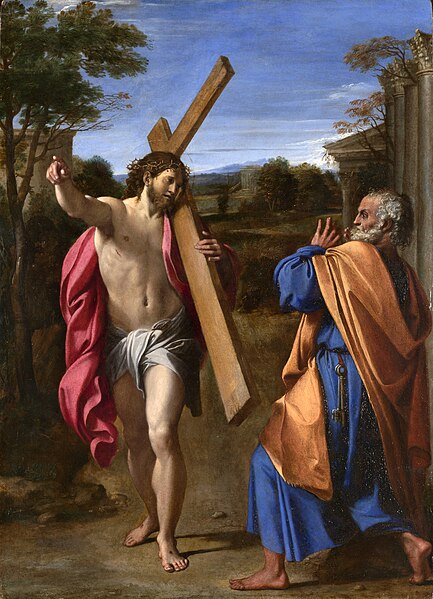
Title: Domine, Quo Vadis?
Artist: Annibale Caracci
Date Painted: c. 1601-1602
Period: Baroque
Medium: Oil on Panel
Dimensions: 77cm x 56cm
Location: National Gallery London
Summary
“Domine, Quo Vadis?” is a significant work by Annibale Carracci, painted in 1602 during the Italian Baroque period. The painting is housed in the National Gallery, London, and is known by the title “Christ Appearing to Saint Peter on the Appian Way.” It depicts a scene from the apocryphal Acts of Peter, showcasing a rare artistic representation of the theme “Quo vadis.”
The narrative behind the painting is deeply rooted in Christian tradition. It illustrates the story of Saint Peter fleeing Rome to avoid persecution. On his way, he encounters the resurrected Jesus Christ. Peter asks Jesus, “Domine, quo vadis?” which translates to “Lord, where are you going?” To this, Jesus responds that he is going to Rome to be crucified again. This encounter convinces Peter to return to Rome and face his martyrdom, symbolizing faith, courage, and the Christian commitment to following Christ’s path, even unto death.
Annibale Carracci, a founder of the Italian Baroque movement, utilizes this canvas to explore themes of sacrifice, faith, and divine guidance. The painting is notable for Carracci’s masterful use of color, composition, and his ability to convey deep emotional and spiritual narratives, which were central to Baroque art. Carracci’s depiction of this poignant moment not only illustrates his technical skill but also reflects the Counter-Reformation’s emphasis on strengthening faith through visual arts.
“Domine, Quo Vadis?” stands as a testament to Carracci’s innovative approach to religious art, marrying classical ideals with the emotional depth and dynamism characteristic of the Baroque era. This work, through its historical and spiritual significance, contributes to Annibale Carracci’s enduring legacy as one of the Baroque period’s most influential artists.